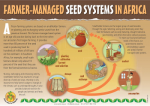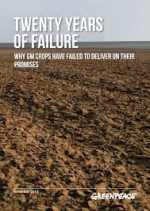Articles
12.11.2015 | permalink
Easy to read seed posters for smallholder farmers and civil society

The African Centre for Biodiversity (ACB) is pleased to share 10 easy to read posters on intellectual property rights in relation to seed and what these mean for smallholder farmers. These posters come at a time where there is pressure on African governments to adopt new stringent intellectual property laws, namely, Plant Variety Protection (PVP) on seed. These new PVP laws give strong rights to breeders while undermining farmers' rights and seed sovereignty. Most farmers and civil society organisations have been locked out of the process of developing these PVP laws, while others are keen to learn more about what these laws entail.
The posters have been produced in various languages and are available for download in English, French, Swahili, Shona, IsiZulu, Sotho, and Portuguese.
They are available on a range of topics including: Farmers Rights and the Seed Treaty; What is Plant Variety Protection (PVP) and protected varieties?; Seed sovereignty for farmers; Women as custodians of seed; Plant Breeders' Rights; Farmers' Rights and UPOV 1991; Farmer-managed seed systems; Seed from the commercial sector; Monsanto's theft of Turkey's purple carrot; Sui generis laws for PVP/PBR protection; and ARIPO: harmonisation of Plant Variety Protection in Africa.
The posters are written in plain language and have been illustrated. They are therefore, simple and easy to read and represent a good source of information to share with farmers. The posters will be particularly useful in assisting in training workshops, farmer field schools, farmer to farmer trainings and other farmer and civil society fora in order to share knowledge and information with and between farmers.
To download the posters please click on this link:
http://www.acbio.org.za/lists/lt.php?id=Yh8GB1dIU1FICQgAAA
10.11.2015 | permalink
Glyphosate Must Fall
The South African government needs to ban the use of glyphosate in our food system with immediate effect.
Glyphosate (most commonly known as RoundUp) is the most widely used herbicide in South Africa and its use has increased dramatically since the introduction of genetically modified maize, soya and cotton that has been engineered to survive being drenched with it. Glyphosate is also extensively used in wheat, viticulture, sugarcane and the timber industries.
The International Agency for Research into Cancer (IARC), which falls under the World Health Organisation (WHO), has recently classified glyphosate as a “probable human carcinogen”; its continued use poses unacceptable risks to our health, the health of our families, farmers, farmers' families, farm workers and society.
Please sign this petition and share it widely to demand a ban on glyphosate in our food system and to demand a commitment from government to transform our corporate controlled, chemical-laden food systems to a socially just agro-ecological food system.
#GlyphosateMustFall
05.11.2015 | permalink
Twenty Years of Failure Why GM crops have failed to deliver on their promises

Twenty years ago, the first genetically modified (GM) crops were planted in the USA, alongside dazzling promises about this new technology. Two decades on, the promises are getting bigger and bigger, but GM crops are not delivering any of them. Not only was this technology supposed to make food and agriculture systems simpler, safer and more efficient, but GM crops are increasingly being touted as the key to 'feeding the world' and 'fighting climate change'.
31.10.2015 | permalink
Civil Society Outraged at Secret GM Maize Trials
We, the Tanzania Alliance for Biodiversity (TABIO), are outraged by plans by the Ministry of Agriculture, Food and Cooperatives and the Commission for Science and Technology (COSTECH) to conduct open field trials of genetically modified (GM) drought tolerant maize and insect resistant GM maize at Makutupora, Dodoma, as reported in the East African Newspaper of 27th October 2015. While these trials will start in April 2016 there has been no consultation with concerned stakeholders, civil society organizations, farmers and consumers as required by law. The application for regulatory approval has not been made public and no environmental impact assessment has been carried out, both of which are required by the national biosafety regulations.
29.10.2015 | permalink
Hungary Urges European Commission To Ban Genetically Modified Maize Varieties
Hungary has submitted a petition to the European Commission (EC) asking for a ban in Hungary on all genetically modified maize varieties that have production licences or are about to get one in the European Union, the Ministry of Agriculture told news agency MTI. The Hungarian government sent its petition on September 21, asking for the ban of 8 products.
29.10.2015 | permalink
USA: GMO backlash threatens beet farmers as foodmakers swap sugars
America's sugar beet growers are under siege as U.S. food companies increasingly shun genetically modified (GMO) crops.
29.10.2015 | permalink
European Parliament Opposes National Bans on GMO-Food Imports
The European Parliament rejected a draft law that would give individual countries in Europe scope to ban imports of genetically modified food and animal feed, potentially killing an initiative that was greeted with widespread criticism.
27.10.2015 | permalink
Canada: Study Exposes AquaBounty's Bogus Growth Claims on GMO Salmon
For those of you who have read the Mary Shelley novel “Frankenstein,” you remember that the name refers to the scientist Victor Frankenstein, not the monster he constructed from body parts found in the local cemetery. The story has captured the public’s imagination for nearly 200 years, and “franken” has become a common prefix—and a pejorative—for genetically modified organisms (GMOs), which are made with cut-and-pasted genetic material from different species of plants, animals and microorganisms.
21.10.2015 | permalink
Brazilian soy exporters, crushers and farmers should keep their eyes on German GM free trend, says retailer
There is a now a huge momentum in Germany to convert all private label meat sectors to GM free soy, said the German Association of Food without Genetic Engineering (VLOG).
21.10.2015 | permalink
EU: Change in proceedings for cultivation of GMOs
The provisions on the cultivation of genetically modified organisms (GMOs) set out in EU Directive 2001/18/EC were seen as highly dissatisfactory by many observers in Austria, where the GMO issue has long been a sensitive one.
